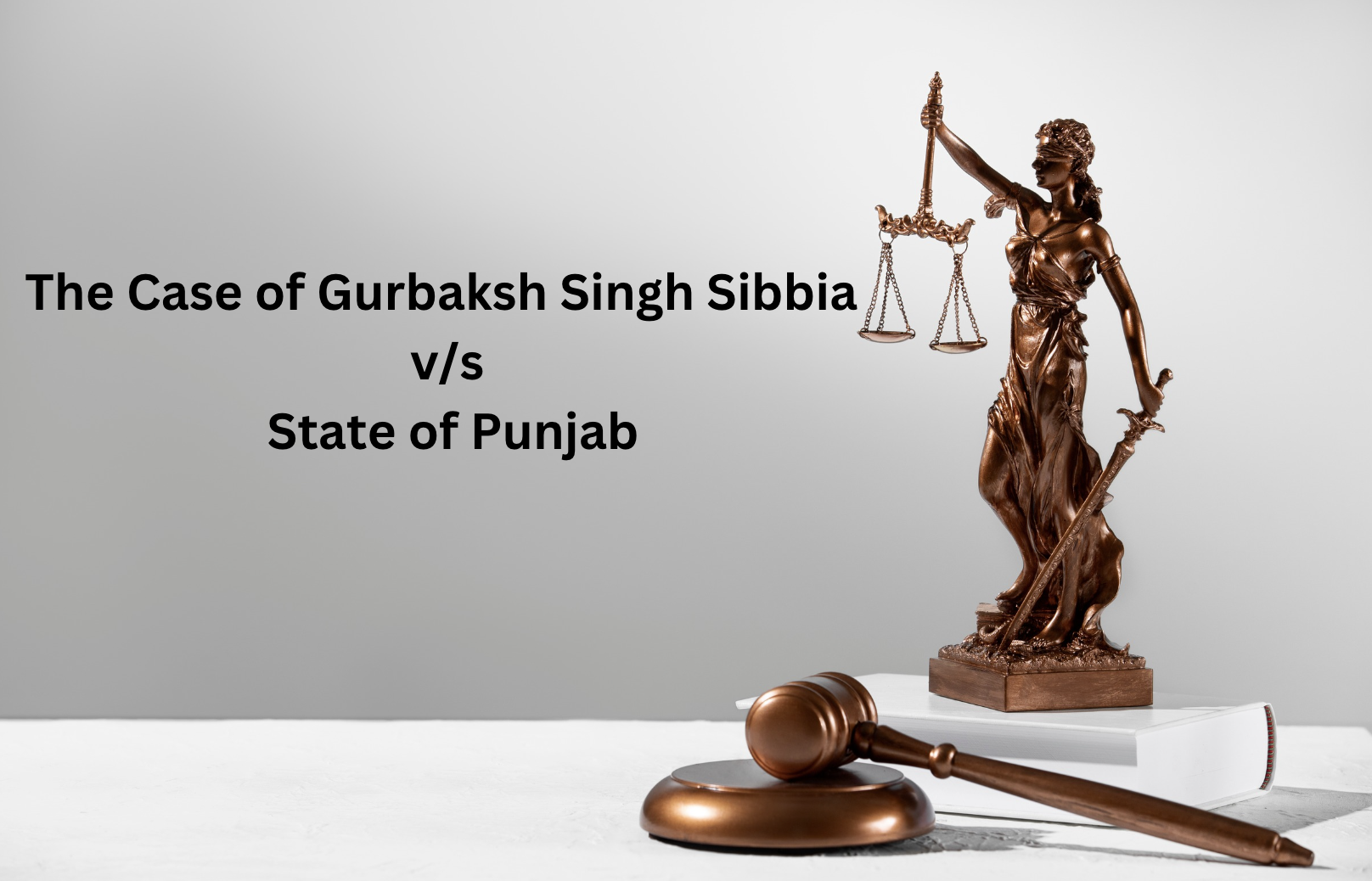
This case is historic because it concerns anticipatory bail under section 438 of the code of criminal procedure, 1973 (CrPC), which states that anyone who believes they may be arrested for a crime for which they are not eligible for bail may apply to the High Court or the Court of Session for a directive under this section. If the court deems it appropriate, it may order the release of the accused person on bail in the event of an arrest.
Prior to going into great detail about the case, it is important to comprehend what anticipatory bail is. A person may be placed under arrest or granted bail, contingent upon the seriousness of the offense committed. The Code of Criminal Procedure, 1973 (often known as “the Code” or “CrPC”) divides crimes into two categories: those that are eligible for bail and those that are not. According to Section 2(a) of the Code, offences that are subject to bail are those that are specified as such in the First Schedule or by any other currently enacted legislation. The remaining residuary offenses have all been classified as being exempt from bail. The former typically consists of less serious offenses, whereas the latter typically consists of far more serious offenses.
gurbaksh singh sibbia v state of punjab Case Facts
- The lawsuit concerns Gurbaksh Singh Sibbia, the Punjab government’s Minister of Power and Irrigation. He and other ministers were charged with serious corruption.
- The ministers applied for anticipatory release under section 438 of the code of criminal procedure before the Hon’ble Punjab and Haryana High Court, anticipating their arrest. Acknowledging the significance of the issue, the lone judge forwarded the case to the entire High Court bench.
- The High Court denied the applications on the grounds that Section 437 of the CrPC governed the High Court’s limited authority to grant anticipatory bail.
- These authorities could only be used in specific, unique situations. The petitioners, who were offended by the High Court’s ruling, filed a special leave petition with the Hon. Supreme Court of India in accordance with Article 136 of the Indian Constitution.
gurbaksh singh sibbia v state of punjab Issues
- The Supreme Court was asked to decide whether section 438 of the code of criminal procedure, which requires the Court to follow certain procedures when granting anticipatory bail, may be subject to a straight-jacket formula.
Contentions by the Parties
Petitioner:
- The appellants’ initial argument was that denying bail to someone who hasn’t been found guilty of a crime is equivalent to taking away their personal freedom. As a result, the Court shouldn’t be inclined to impose needless restrictions when granting anticipatory bail in accordance with Section 438 of the CrPC. Furthermore, it was argued that Section 438 was not intended by the legislature to impose any needless limitations.
- The appellants also made the significant claim that any limitations imposed under Section 438 of the CrPC would have been invalidated for violating article 21 of the indian constitution. The personal liberty of the individual requesting bail would be violated by any arbitrary restriction on the authority to grant bail. It is necessary to assume the innocent until proven guilty for such a person.
Respondent:
- The respondents’ main argument was that, in extraordinary circumstances where the applicant can demonstrate that the arrest is likely to occur for petty or malicious reasons, anticipatory bail should be granted.
- It was also argued that anticipatory bail is an extraordinary remedy and that the applicant should be left to the regular remedy of applying for bail according to Section 437 or Section 439 of the CrPC after he is arrested, provided the allegations seem plausible on their face.
gurbaksh singh sibbia v state of punjab Judgment by High Court
After summarizing the terms of Section 438 of the CrPC, the Full Bench of the Punjab and Haryana High Court denied the appellants’ requests. The following format for the summary was used:
- Preliminary bail is an extraordinary power that should be exercised sparingly;
- No clause in the CrPC gives the court the authority to issue blanket bail for any offense that the accused person has not committed or for which they are being accused;
- Section 438 of the CrPC shall be interpreted to incorporate all the restrictions stipulated in Section 437;
- The applicant must establish a unique circumstance in order for anticipatory bail to be granted, in addition to these restrictions;
- If there is a good reason to remand the accused to the custody of the police or the investigating authority under Section 167(2) of the CrPC, or if there is a good reason to gather evidence against the accused according to Section 27 of the Indian Evidence Act, 1872, the power under Section 438 cannot be used;
- When it comes to offenses carrying a death sentence or life in prison, the court’s discretion according to Section 438 cannot be used unless it is certain that the charge is unfounded or fraudulent at that point.
- Additionally, the Court must be convinced that the charges against the applicant are false on their face in order to exercise the discretion granted by Section 438. The Court may not use political authority to further its discretion in cases of public importance, such as corruption.
gurbaksh singh sibbia v state of punjab Judgment by Supreme Court
- The Punjab and Haryana High Court erred, according to the Supreme Court, in placing stringent restrictions and requirements on the granting of anticipatory bail under section 438 of the code of criminal procedure that are not found in the actual statute text.
- The language used in section 438 of the code of criminal procedure gives High Courts and Courts of Session broad authority to grant anticipatory bail. It is not appropriate to limit this discretion by adding strict requirements to the clause.
- Propositions made by the High Court, such as that the applicant must establish a “special case” and that the authority under Section 438 should only be used in extraordinary circumstances, were rejected by the Court.
- It concluded that under section 438 of the code of criminal procedure, no rigid regulations may be established to restrict the authority of judges. The facts and circumstances of each case must be taken into consideration as the courts use their discretion.
- The statutory provision granting anticipatory bail must be liberally interpreted in favour of individual freedom, since it is a crucial tool for securing personal freedom.
- The Court did, however, concur with the High Court’s assertion that general orders of anticipatory bail should not be granted since the suspicion of being arrested must be supported by reasonable reasons with respect to a particular charge.
- The Court gave advice on matters such as whether filing a formal complaint is necessary prior to requesting anticipatory bail, bail following an arrest, the duration of orders, notifying the public prosecutor, etc.
Guidelines by the Court
- Uncertain and imprecise allegations are ineligible for the use of Section 438 of the CrPC. Only in situations when the applicant has “reasons to believe” that he might be arrested may the clause be used. The applicant’s belief cannot be equated with mere fear. The applicant must therefore keep in mind that the grounds for anticipatory bail are of a kind that the court can examine objectively. An individual is not entitled to seek for anticipatory bail based only on accusations made without sufficient grounds.
- The purpose of Section 438 is to give the High Court, or the Court of Session, depending on the situation, discretionary authority. As a result, a court of this kind cannot allow a magistrate to decide the matter as specified according to Section 437 of the CrPC. To do so would be to negate the fundamental intent behind the clause.
- It is not necessary to file an FIR prior to submitting an application for anticipatory bail. Even if the petitioner has specific grounds to believe they may be arrested, they may still apply for it.
- As long as the individual in question has not been taken into custody, he may still be eligible for anticipatory bail even if a formal complaint has been made against him.
- In the event that the subject has been placed under arrest, anticipatory bail cannot be granted. In this situation, the accused must request release under either Section 437 or Section 439 of the CrPC, depending on the circumstances.
- Aside from these rules, the Supreme Court agreed with the High Court’s position that an individual cannot be given a blanket anticipatory bail when they have no reasonable suspicion of being arrested. An order that provides absolute protection against arrest for any kind of offense is known as blanket anticipatory bail. An order of that kind would be against the public interest since it would severely impair the investigating agency’s authority. As a result, no general anticipatory bail may be set.
With the goal of giving students the best coaching available for law entrance exams including the CLAT, AILET, and various other numerous state judiciary exams, Jyoti Judiciary Coaching, India’s Finest educational Platform, was established. Come enrol now with Jyoti Judiciary!
For any latest news, legal topics, judiciary exams notifications, patterns, etc watch Jyoti Judiciary’s YouTube channel for legal videos for any updates at https://youtube.com/@jyotijudiciarycoaching4852?si=2cwubh9d2A9urwJf








